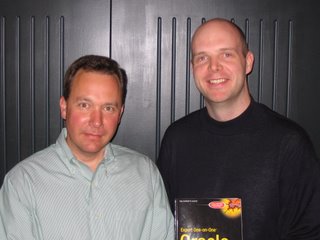Sunday, June 18, 2006
Meeting Tom Kyte
"You have redeemed my faith, after last year's presentation, which was such a disappointment."- One of Tom Kyte's biggest fans in COUG

Renowned Oracle expert and author of highly popular blog, pictured here with Tom Kyte.
I first met Tom Kyte about twenty minutes before his presentation about his favourite features in Oracle 10g. When I went up to introduce myself, I figured he was putting the final touches on his presentation, but he was actually answering questions for his AskTom web site. I guess you have to find the time for that somewhere!
Due in part to his reputation for fine speeches (his biggest fan notwithstanding), there were quite a few people in attendance. Tom reports having answered 33,000 different Oracle-related questions. I wonder how many people were there hoping they could find that one question that pushed him over the edge. Sadly, no such luck.
I enjoyed the presentation myself, despite still being on Oracle 9. Based on some of the features, including DBMS_SQLTUNE which uses SQL Profiles to find patterns in your data that can help speed up queries, I wonder how long before he comes to town announcing that the next release of Oracle is sentient.
I was a little surprised to hear his excitement about DBMS_ADVANCED_REWRITE, which allows you to tell Oracle "listen, when I write this query, what I REALLY want is this completely different query." I can't believe I'm going to have to learn to start typing "FOR_REAL" after all my queries. Maybe in Oracle 11 we'll need "NO_SERIOUSLY_I_MEAN_IT".
On a more serious note, it sounds like Oracle 10 has a lot more bells and whistles ultimately aimed to speed things up. Take PL/SQL compilation for example. When you "CREATE OR REPLACE" it will check whether a recompilation is really necessary, and will also look for optimizations within your code. I guess the end result is a little bit more overhead to check for things, but faster results, especially for inexperienced programmers.
Afterwards we all retired to Bottlescrew Bill's for COUG's annual social, where I enjoyed Tom's stories almost as much as his presentation. In contrast to the light-hearted ribbing with which I began this post, virtually everyone ranks him as one of the very best Oracle speakers. I'm really glad he paid us a visit, and look forward to hearing him again.


Renowned Oracle expert and author of highly popular blog, pictured here with Tom Kyte.
I first met Tom Kyte about twenty minutes before his presentation about his favourite features in Oracle 10g. When I went up to introduce myself, I figured he was putting the final touches on his presentation, but he was actually answering questions for his AskTom web site. I guess you have to find the time for that somewhere!
Due in part to his reputation for fine speeches (his biggest fan notwithstanding), there were quite a few people in attendance. Tom reports having answered 33,000 different Oracle-related questions. I wonder how many people were there hoping they could find that one question that pushed him over the edge. Sadly, no such luck.
I enjoyed the presentation myself, despite still being on Oracle 9. Based on some of the features, including DBMS_SQLTUNE which uses SQL Profiles to find patterns in your data that can help speed up queries, I wonder how long before he comes to town announcing that the next release of Oracle is sentient.
I was a little surprised to hear his excitement about DBMS_ADVANCED_REWRITE, which allows you to tell Oracle "listen, when I write this query, what I REALLY want is this completely different query." I can't believe I'm going to have to learn to start typing "FOR_REAL" after all my queries. Maybe in Oracle 11 we'll need "NO_SERIOUSLY_I_MEAN_IT".
On a more serious note, it sounds like Oracle 10 has a lot more bells and whistles ultimately aimed to speed things up. Take PL/SQL compilation for example. When you "CREATE OR REPLACE" it will check whether a recompilation is really necessary, and will also look for optimizations within your code. I guess the end result is a little bit more overhead to check for things, but faster results, especially for inexperienced programmers.
Afterwards we all retired to Bottlescrew Bill's for COUG's annual social, where I enjoyed Tom's stories almost as much as his presentation. In contrast to the light-hearted ribbing with which I began this post, virtually everyone ranks him as one of the very best Oracle speakers. I'm really glad he paid us a visit, and look forward to hearing him again.

